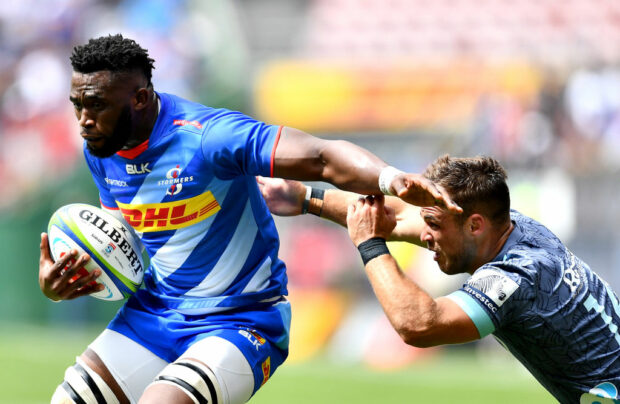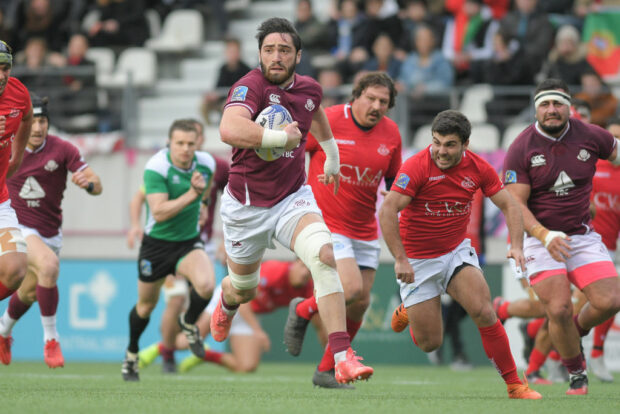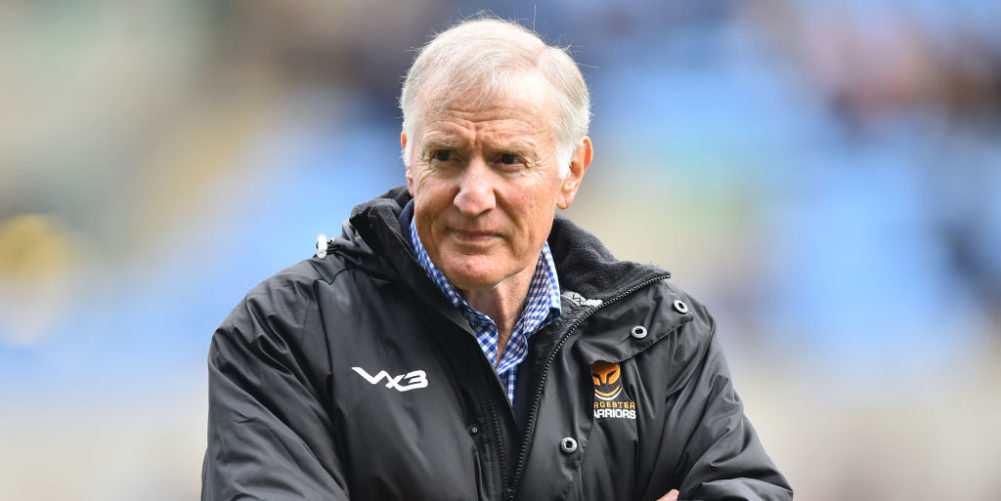Vastly experienced Worcester director of rugby and former World Rugby consultant Alan Solomons offers NEALE HARVEY strong opinions on the need for a truly global game.
Are you confident Worcester can survive coronavirus financially?
Absolutely confident. We've got great owners in Colin Goldring and Jason Whittingham and they're on top of things. Everyone needs to be safe, that's the most important thing and at Worcester we've been able to give our players a programme to keep them in good condition. It's difficult because they can't attend Sixways or any gyms, but they're ticking over.
How's your recruitment and retention being affected?
Fortunately, we were ahead of the game and I've been able to look ahead to next season and how we will approach playing again, whenever that may be. We're pretty far down the road with recruitment and retention, with just two or three things to be wrapped up, and I'm happy we went early because it's been a retention cycle for us and the key was to keep all of our young players, which we've done.
Led by re-signing Ted Hill, I presume?
Yes, Ted's a headline guy who's re-signed along with another headliner in Ollie Lawrence, but I'm equally pleased that guys like Will Butler, Kai Owen, James Scott, Justin Clegg, Nick David, Beck Cutting, Joe Morris, Tom Dodd and all our other younger guys have re-signed. I'm totally wedded to the idea of bringing homegrown players through and I think we've got the makings of a really good team. I'm chuffed to bits that we've retained them and we'll have 14 of them in our first team squad next season. Key to Worcester's future is a vibrant, flowing academy.
Regarding new signings, do you expect your centre Ryan Mills and Billy Searle (currently Wasps) to swap clubs after June 30 when their respective contracts expire?
They've got legal contracts and our new contracts run from July 1 – that's how it works, it's the law and I anticipate that happening across the Premiership. If a player has signed for a club, he will go to that club and to me it's absolutely clear that they're binding contracts. The fact that the competition hasn't been able to conclude within that period hasn't got any impact on the contract.
There's been talk of reducing the Premiership salary cap, what's your view?
These kind of situations always lead to a lot of reflection and a little bit of a reset. The pandemic has impacted finances throughout the world and all businesses are reassessing how they operate. This crystallises things and right across world rugby – Europe, South Africa, New Zealand, Australia, everywhere – the financial models need to be looked at and the Premiership is no different.

Even before this crisis Super Rugby was in the doldrums, what's your view of what's happening in the southern hemisphere?
I think Super Rugby is fatally flawed. I was fortunate to be involved at the Stormers between 1998 and 2001 when Super Rugby was a magnificent competition; nobody had gone overseas, it was 12 top teams and you had one bye week, everyone played each other and you had semi-finals and a final that were fantastic spectacles.
All games were massively attended. At the Stormers we packed the ground – 55,000 – and the quality of rugby was superb. But then in 2006 it went to 14 teams, then to 15, 18 and back to 15 again and now nobody understands it. The pool format they've got is totally flawed because you can get to the final without playing the Kiwi teams or make the play-offs with an inferior record to others.
Look at Super Rugby now and there are no crowds so they're certainly going to have to look at that model again – fewer teams, higher quality like the Premiership, which for me is the best competition in world rugby right now – but the problems run much deeper than that and it's great that both candidates who are running for the chairmanship of World Rugby, Bill Beaumont and Agustin Pichot, are hell-bent on a global season. I'm pleased about that and it has a real prospect of happening now because of the financial implications of this pandemic.
What makes you so certain of that and what do you mean by ‘a global season'?
As an example, Australia are in dire straits so they're going to have to do this properly. The idea of a Nations Cup is going to come back to the fore and both candidates are supportive of that as well, so if that happens then what I would say – and something I've always believed in – is that you will end up with a nine-month global season where nobody plays in December, January and February. It has to be that way because it is too hot in the southern hemisphere at that time. In the UK, I know there are traditions around playing at Christmas but if you want a truly global season, which for me is a must if you want to grow the game as a world sport, how else do you do it?
What would your ideal global season structure look like?
I'd have a six-month block – March to August – where we play our elite domestic and cross-border club competitions, followed by a three-month window in September, October and November where you play international rugby and have domestic development competitions running concurrently.
You would then have that six-month window for elite club rugby with no crossover with internationals, while from September it would be clear for worldwide, money-spinning Test rugby with no overlap. At the moment in the northern hemisphere everything is mixed up, but by having that three-month Test block with development competitions acting as a player proving ground for the following year, you would inject some really clarity and flow into the fixture schedule.
What other advantages are there?
If you do this, it gives ALL players a proper break during December and early January, after which you can filter people back into pre-season ahead of a March 1 restart. I know there will be some challenges but between March 1 and November 30 all players would be available, playing in appropriate levels of competition. If we're going to have a true reset, it needs to be on a global basis.

Why are you so keen on a Nations Cup being part of a three-month Test block?
It would drive development. There have been arguments about Georgia's readiness for many years and we have to work out how to fit them into the model, so if you're creating a new three-month Test window there's the scope to fit them and others like them in and give all the Tier Two nations a hope of progressing to the top table. Questions need to be answered but it is clear to me that whether it's Beaumont or Pichot in charge, they want a global season and a Nations Cup.
Of course, the elephant in the room is the Six Nations. How do you persuade that mighty beast to shift?
The Six Nations is obviously a fantastic competition with a tremendous tradition about it, but that isn't going to change by moving it and a global season has to be just that – you can't have a halfway house. It needs to be nine months where everybody is aligned and you have to stop the current summer and autumn tours when people are exhausted. It's difficult with the Six Nations, I appreciate that, but this is global rugby we're talking about and this pandemic has shone a light on certain aspects of the game that we need to get right – and now is the time to do it.
We have to get to a situation where all players get a proper break at the same time of the year – December to February – and where the domestic and international windows are separated. You could then play a World Cup every four years without the French and UK seasons being impinged upon as they are now.
How frustrated are you that Tier Two countries are continually being held back?
When I was involved with World Rugby – or the IRB as it was then – between 2005 and 2010, I had eight countries under me in Russia, Georgia, Romania, Spain, Portugal, Namibia, USA and Canada and the big objective was to improve the quality of those countries.
We saw progress and the intention was to make rugby a truly global game, but it's only gone so far and that's why the global season and the Nations Cup must happen. What drives development of players, coaches, administrators and referees is competition, and the higher the competition is, the better it is for development.
Georgia have established themselves unassailably in the northern hemisphere but they now need an opportunity to play at a higher level. It's the same with Japan, USA and the Pacific Islands and you've got to create opportunities for them, which is why I think the Nations Cup has to come to fruition. What you've seen over a period of time is World Rugby have tried to get games going between Tier One and Tier Two nations but we've never really broken the mould, so that's got to happen now.
Japan being an excellent case in point after their last two World Cup showings?
Yes, absolutely. Eddie Jones did a fantastic job with Japan and Jamie Joseph and Tony Brown have followed that up, so they need to be playing at the top level now. They've proved themselves, but where do they go? We've got to do something about Samoa, Tonga and Fiji and instead of plundering them, we've got to let them into major competitions because they're good sides and we've got to allow them to become really competitive teams.
Let's allow guys like Charles Piutau to go back and play for Tonga, I think that would be fantastic, and if you allowed sides like them, Japan, Georgia, Samoa, Fiji and the USA to push through properly with the incentive of reaching that top table, suddenly there's six or seven sides there to compete with the Six Nations and Rugby Championship teams. In time, the World Cup would become more meaningful and you have to allow these guys to compete and progress on merit. If one of the traditional powers can't stay up, so be it. In the last World Cup, we saw Uruguay surpass expectations but now they're gone and simply forgotten because they've got no competitive conduit to the top. How are their players supposed to improve? They need to play against the best so you have to create a platform and a competition – a Nations Cup – where they have that opportunity or the game will never become global.
Is it not the case that the Six Nations top brass simply fear change?
That's a big part of it. There are big traditions there and there would be a fear of relegation depending on the format, but the game has to move on and there seems to be a massive opportunity for that now because both Beaumont and Pichot want it. If Pichot gets in, he wants to democratise rugby by introducing one country, one vote – that would change things for sure.
You mentioned Charles Piutau but surely something else that needs facilitating is for guys like Dave Ewers, right, (Exeter/Zimbabwe) and Val Rapava Ruskin (Gloucester/Georgia) to be able to represent their countries without compromising club contracts?
We need to have a proper look at eligibility so you've got certain dispensations that encourage guys to play for their countries. Ewers and Rapava Ruskin will both have England ambitions but we should be encouraging guys to play for their own countries without prejudicing them.
Given the financial crisis here, would it not make sense for the RFU to contract England players?
If you look at Scotland and Ireland, their professional teams are run by the SRU and IRFU. The Premiership is not run by the RFU, it's run by Premiership Rugby and guys are contracted by the clubs.
There are a lot more players in England, it's a massive competition in which the owners have invested a huge amount so it's important they retain an element of control over these players. There's a deal between the RFU and Premiership Rugby whereby England players are always available and clubs are incentivised to produce England-qualified players, but I come back to my point about having a truly global season. If you took away all the club v country issues by having a dedicated three-month Test window, a lot of the current problems would go away.
We haven't mentioned the British & Irish Lions yet. Would you retain that famous touring side and, if so, where would they fit in?
The Lions should stay because that's an incredible tradition and a place must be found for it. I know that in South Africa, New Zealand and Australia they can't wait for those tours and it's the pinnacle of a lot of players' careers to play on one. The Lions have to be included and if that means you've got to slightly redraw the Nations Cup in a Lions year, it has to be accommodated. Pichot has said he wants to expand the scope of Lions' tours to take in the Americas, Asia and the Pacific Islands so that could be embraced as well, as long as the level of competition is there.
Back to the Premiership, it's clear that the gap between England's top-flight and the Championship has grown massively, so is it time to take a different approach and move towards an expansion or franchise system?
Competition is key and the model is broken at the moment because every team that goes down comes straight back up and nobody is getting close to stopping that. It's been happening for a decade and the last team that came up from the lower league as a genuinely new side and made it stick were Exeter in 2010. The bottom line is there is now an enormous gulf between the Premiership and Championship and people must accept that something must be done. The Premiership clubs all have strong, vibrant academies and this pandemic may have hastened the process towards a clear distinction between the Premiership and Championship and future movement between them.

























